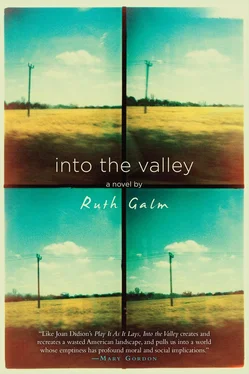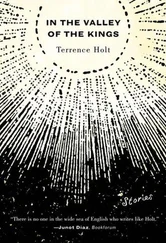“I don’t really read poetry,” B. said.
“Most people don’t.” He got up to refill their drinks and then sat down beside her on the couch. He stretched an arm out behind her shoulder. She found she didn’t mind.
“How old is your wife?” It was the scotch, she realized. The scotch was making her open, calm.
“You’re awfully interested in my wife.”
“You asked my age.”
“Look, let’s get to this. What are you, pregnant? A dyke? Wanted by J. Edgar Hoover?”
“I just think it will help.” She was suddenly aggravated. “To get away from the city for a while. It’s really none of your business anyway.”
“I’m sorry,” he said. His face filled with what looked like true remorse. “That was wrong of me.” He drank down the rest of his glass. “I like a few drinks, honestly. I get uncivilized sometimes. It’s why my wife is out east at the moment.”
They sat silent.
“Hey, do you know the one about the blonde and the drunk professor? Hilarious. Just wait a few days and I’ll remember the punch line.”
She smiled.
He stood up, slightly swaying. “We need a bit of dancing, I think.” He held out his hand.
She hesitated. But it was all nice, the talking, the drinking, the dimness. She rose and took his hand. They began to shuffle together back and forth clumsily, she on the side of her foot. His smell was richer in the dark. The room swirled around her as they rocked, the books and the objets d’art taunting with their French titles and hanging breasts, the burning cities and Jayne Mansfield’s decapitated head in the newspapers at their feet.
He murmured in her ear. “Take me with you. Sounds like a good time. I’ll be your helmsman.” He kissed her wrist.
She thought in a part of her mind that she should not let a married man kiss her. But she liked him breathing in her ear, she liked a handsome professor trying to figure her out.
They danced cheek to cheek (he was not much taller than she when they stood together), his skin salty, cologned. She felt the swaying had to do with the room, not their own bodies, it rocked her into a kind of trance. The carsickness was buried underneath the layers of scotch. She should drink more often, she thought.
“I played with paper dolls when I was younger,” she whispered into his ear. The image appeared to her as they danced: a dozen ladies’ punch-out outfits with tabs on her bedroom floor, flouncy chartreuses and roses and tangerines. “It was always the point to see her in something different. One dress grew tiring and you tried another, and it was pretty for a while, and then again it was tiring.” She paused. “I didn’t have any thoughts about this when I was a girl.” He brought her forearm to his mouth and sucked on it for a moment, his dry lips and rough tongue spurring on the memory of the dolls. “But now it seems so disturbing to me. That I would think of the doll with no care or concern but what new different dress to wear. What did she do all day? I never thought about it. I never thought about what her days would be like.”
“They were just paper, darling.” Now he nuzzled her neck. “Just dolls.”
“But I should have considered. .” The scotch had gone all through her body and the kisses tingled on her skin, rippling inside her. Her thoughts splintered. The jazz was swirling in a low moaning wail.
“Is your wife ever nauseous?” she asked abruptly.
“Nauseated,” he corrected, licking her collarbone. “I wouldn’t know, we don’t talk about female things.” He unzipped the back of her dress. Her back spasmed when his fingers brushed it. He took down her bra straps and cupped her breasts. “No more about her,” he whispered.
He moved her to the couch. He emptied the last bit of scotch into their glasses and finished his in a single go. He pressed her back on the couch and began kissing his way down her breasts and onto her stomach. Somewhere again she thought she must stop; he was married. But the sensation of the kissing and the scotch and having confessed about the dolls made her malleable, new. At her navel he stopped as if struck by something. “People don’t really talk, you know. The hippies think we’re so rotten and bourgeois, and they don’t talk any more than we do — communicate, I mean. I mean, what are they really saying to each other with all this ‘turn on and groove’? It’s all another way to obfuscate. Cover over the void. Just a different language of avoidance.”
He seemed to be speaking to an entire room, not B. in particular, but she did not mind. She lay on her back with her eyes closed, her own voice in her head disappearing. She felt he might have sensed this.
“I see the fear in my students’ eyes,” he went on. “Those guys outside the window just now. They oughtta be scared. There’s no way to know they have it right anymore. They may be totally wrong, useless. I have nothing to tell them.” He laid his cheek on her breasts. “They see the others living in the parks, getting high and sticking it to the Man, so what are they supposed to think about themselves? What can I tell them? Subconsciously it grinds them. Subconsciously. .”
B. was soft and serene in her drunkenness now; no spinning anywhere. She stroked his hair. He inched up next to her until their faces touched. It seemed she had left the city and traveled to the valley precisely to find this man.
He took her hand and pushed it down his pants, guiding it back and forth over his penis. “I wish I had some grass for us,” he said.
She craned her mouth toward his, rubbing the penis dutifully, losing her rhythm occasionally. “Say more,” she murmured.
“About the grass?”
“No, no. . the other. .”
“Yeah, baby? You like the talking? Alright then. . Listen, it’s all a wash. The rules they’ve been setting up this whole time. The rules will never paper over the abyss, never get it out of our heads, and now the holes are showing up. The fraying. But the holes are deep, unfathomable. The expectations are tumbling down. People don’t know which way to go. The crybabies yell about ending the war, and they don’t see that it doesn’t even matter, the whole charade will end in war and famine and misery. Keats said it — nature and youth and suck at the beauty before it rots. The kids get high, wait for the parents to die. Ha!” He laughed at his own rhyme.
It struck B. even in her drunkenness that his disquisition about non-believing might be just another form of believing, another attempt at “papering over.” But the scotch swallowed the validity of this thought. Anyhow, she preferred the sureness of his authoritative voice. She wanted it to keep talking.
“What does your wife think of the war?” she asked.
“This wife obsession is a serious bummer, as our friends would say.” He reached for his empty glass on the coffee table and licked the inside rim. “Never enough,” he sighed. “To answer your question, my wife does not think about the war. She may give you an opinion but she does not spend any qualitative part of her days pondering it.”
“How do you know?”
“Do you think of the war?”
“No.”
“Exactly.”
“But I might if I wanted to. . I could.” Anger rose up weakly through the alcohol. She wondered momentarily if he’d slipped her something stronger; but this thought departed. She struggled to her elbows and he pushed her back down.
“Look, she’s not here, baby, don’t worry. She has what she wants. She has her Ivy Leaguer, her little slice of bohemia. She reads Kant and sketches her nudes and irons my shirts and cooks up spaghetti. She likes it all just fine. She doesn’t concern herself with every part of the arrangement.” He placed B.’s hand, which in her distraction had stopped massaging, back on his shaft and led it up and down more forcefully. “Now where was I? Hmmmm, yes, our children of the flowers and peace and dropping out. Maybe they’re trying to live Keats, I’ll give them that—”
Читать дальше










